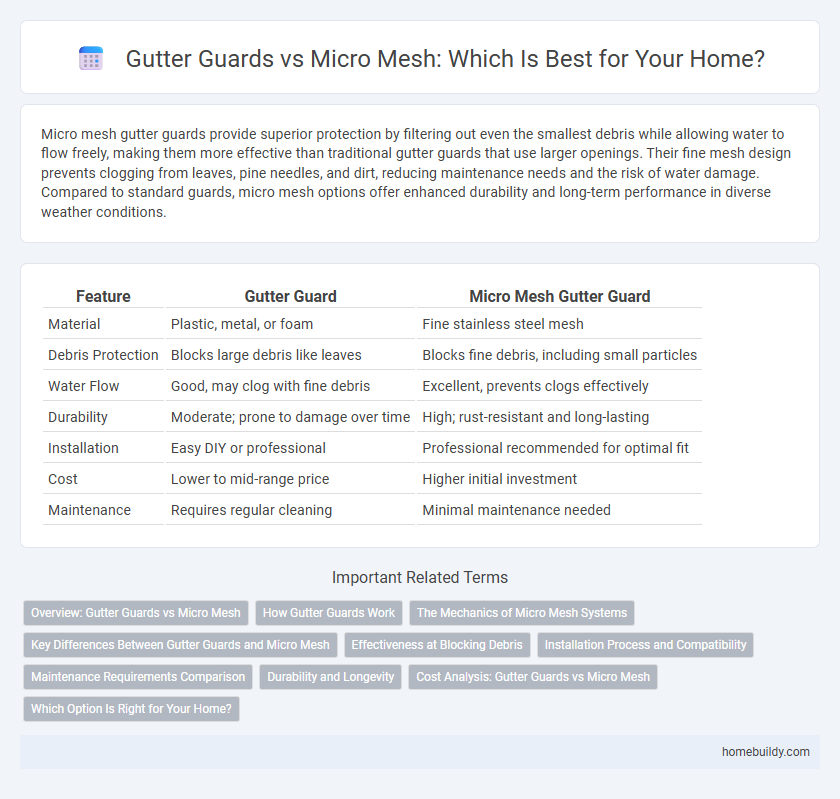Micro mesh gutter guards provide superior protection by filtering out even the smallest debris while allowing water to flow freely, making them more effective than traditional gutter guards that use larger openings. Their fine mesh design prevents clogging from leaves, pine needles, and dirt, reducing maintenance needs and the risk of water damage. Compared to standard guards, micro mesh options offer enhanced durability and long-term performance in diverse weather conditions.
Table of Comparison
| Feature | Gutter Guard | Micro Mesh Gutter Guard |
|---|---|---|
| Material | Plastic, metal, or foam | Fine stainless steel mesh |
| Debris Protection | Blocks large debris like leaves | Blocks fine debris, including small particles |
| Water Flow | Good, may clog with fine debris | Excellent, prevents clogs effectively |
| Durability | Moderate; prone to damage over time | High; rust-resistant and long-lasting |
| Installation | Easy DIY or professional | Professional recommended for optimal fit |
| Cost | Lower to mid-range price | Higher initial investment |
| Maintenance | Requires regular cleaning | Minimal maintenance needed |
Overview: Gutter Guards vs Micro Mesh
Gutter guards and micro mesh systems both protect gutters from debris but differ significantly in design and filtration. Gutter guards typically use solid or perforated materials to block larger debris, while micro mesh features a fine stainless steel screen that filters out even the smallest particles like pine needles and shingle grit. Micro mesh offers superior water flow and clog prevention, making it a preferred choice for homes surrounded by heavy foliage or fine debris.
How Gutter Guards Work
Gutter guards function by creating a barrier that prevents leaves, debris, and pests from clogging the gutters while allowing water to flow through efficiently. Micro mesh gutter guards feature a fine mesh screen that filters out the smallest particles, offering superior protection against dirt and shingle grit compared to traditional gutter guards. This design minimizes maintenance and reduces the risk of water damage by ensuring consistent water drainage.
The Mechanics of Micro Mesh Systems
Micro mesh gutter guard systems function by using ultra-fine, stainless steel mesh that blocks debris while allowing water to flow freely into the gutter. The tight weave of the micro mesh prevents even the smallest particles like pine needles and shingle grit from entering the gutter system, significantly reducing clogs. This mechanical filtration ensures durable protection against various weather conditions without compromising drainage efficiency.
Key Differences Between Gutter Guards and Micro Mesh
Gutter guards and micro mesh systems primarily differ in material composition and filtration efficiency; gutter guards are typically made from metal or plastic with larger openings, while micro mesh features ultra-fine mesh that blocks smaller debris like pine needles and shingle grit. Micro mesh guards offer superior clog prevention and water flow compared to standard gutter guards but require more maintenance to prevent mesh damage and accumulation of fine particles. Installation complexity and cost also vary, with micro mesh generally being more expensive and labor-intensive due to its precise fit and delicate material structure.
Effectiveness at Blocking Debris
Gutter guard with micro mesh technology offers superior effectiveness at blocking debris, preventing leaves, pine needles, and small particles from clogging gutters. The fine micro mesh screen filters out even the smallest debris while allowing water to flow freely, reducing maintenance frequency and enhancing gutter lifespan. Compared to traditional solid covers, micro mesh guards provide the best defense against blockages and water damage.
Installation Process and Compatibility
Gutter guards typically offer a straightforward installation process, often snapping into place or attaching with simple brackets, making them compatible with most gutter types. Micro mesh guards require more precise alignment and fastening, sometimes needing professional installation to ensure the fine mesh sits properly without gaps. Compatibility varies as micro mesh excels on gutters prone to fine debris, while standard gutter guards suit broader gutter profiles and heavier leaves.
Maintenance Requirements Comparison
Gutter guards typically require less frequent cleaning than micro mesh systems because they prevent larger debris from entering the gutters, reducing blockages. Micro mesh guards offer superior filter capabilities for fine particles but can accumulate small debris on the surface, necessitating more regular maintenance. Regular inspection and occasional cleaning of both systems ensure optimal water flow and prolong gutter longevity.
Durability and Longevity
Micro mesh gutter guards feature fine stainless steel screens that resist rust, corrosion, and physical damage, providing superior durability compared to standard gutter guards made of plastic or foam. Their robust construction ensures a longer lifespan, often exceeding 10 years with minimal maintenance, while traditional gutter guards may degrade or clog more quickly due to material wear. Choosing micro mesh guards enhances gutter longevity by effectively preventing debris accumulation and sustaining structural integrity under harsh weather conditions.
Cost Analysis: Gutter Guards vs Micro Mesh
Gutter guards typically offer a lower upfront cost compared to micro mesh systems, making them a budget-friendly option for homeowners seeking basic debris protection. Micro mesh guards, while more expensive initially, provide superior filtration against smaller particles like pine needles and shingle grit, potentially reducing maintenance costs over time. Evaluating long-term value, micro mesh guards often justify their higher price through enhanced durability and reduced gutter cleaning frequency.
Which Option Is Right for Your Home?
Gutter guard systems and micro mesh guards both provide effective protection against debris, but micro mesh offers superior filtration by blocking even the smallest particles like pine needles and shingle grit. Choosing the right option depends on your home's location, roof type, and local foliage, with micro mesh best suited for areas with fine debris and heavy rainfall. For homes in regions with larger debris and moderate rainfall, a traditional gutter guard may offer sufficient protection with easier maintenance.
Gutter guard vs micro mesh Infographic

 homebuildy.com
homebuildy.com